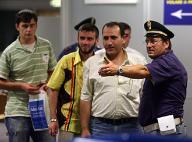Study: Switzerland Tops in Preventing Bribery
Transparency International released a study on Wednesday showing that Switzerland is the most effective among the world's leading exporting nations in preventing its firms from bribing. India came in last in the study.
The corruption watchdog organization Transparency International's "Bribe Payers Index 2006" showed that companies in Turkey have one of the world's worst reputations for paying bribes abroad, while firms in France and Italy are notorious for the practice in Africa.
In the 2006 index ranking, Transparency International (TI) placed Turkey as the fourth worst in the perceived tendency of companies in the world's 30 leading export nations to pay foreign bribes. Turkey came just ahead of Russia, China and India in the index.
 "This is a crucial result as the country pursues its bid for European Union membership," TI said in a statement in Brussels.
"This is a crucial result as the country pursues its bid for European Union membership," TI said in a statement in Brussels."The poor score also raises troubling questions about the commitment to the Organization for Economic Cooperation and Development's (OECD) anti-bribery convention, which entered into force there in 2003," the statement said.
Turkey began membership talks with the EU a year ago but was told that the process would take at least a decade to complete, with no guarantees at the end that it would actually be allowed into the European club.
"Of Turkey's peers in Europe, France and Italy -- both large exporters -- scored poorly," TI said. "Isolating answers from African respondents places Italy and France in the bottom six countries overall."
Good marks
The Bribery Payers Index (BPI) was compiled based on the responses of some 11,000 business people in 125 countries to a World Economic Forum survey this year.
The country thought least likely to offer bribes abroad was Switzerland, followed by Sweden, Australia, Austria, Canada and Britain. The United States was not far behind in ninth place, tying with Belgium.
Germany fared relatively well in the survey, coming in seventh place -- despite the controversy surrounding German-American motor company DaimlerChrysler's recent admission to paying bribes in Africa, Asia and eastern Europe.
"We saw that Germany fared pretty well given the fact that it has three times as many opportunities to bribe," Hans-Jörg Elshorst, head of TI's German branch, told DW-RADIO. "It is the world champion of exports, but thankfully, is not a champion of corruption."
Rating is relative
However, no country was able to completely prevent its companies from making improper payments. Elshorst said that there was very little that actually separates the best performers from the worst on the index.
"There are different levels, but even the first and the last -- Switzerland and India -- are pretty close together," he said. "The difference is just three points of 10 possible points."
On a scale from 10, for no corruption, down to 1, for vast corruption, Switzerland scored 7.81 while India scored 4.62.
Profiteering from development money
 To cut down on the bribery practice, TI recommended that wealthy OECD countries step up enforcement of the organization's anti-bribery convention. It urged development banks to debar companies found guilty of bribery abroad. The organization also encouraged China, India and Russia to sign on to the convention voluntarily.
To cut down on the bribery practice, TI recommended that wealthy OECD countries step up enforcement of the organization's anti-bribery convention. It urged development banks to debar companies found guilty of bribery abroad. The organization also encouraged China, India and Russia to sign on to the convention voluntarily."It is hypocritical that OECD-based companies continue to bribe across the globe, while their governments pay lip service to enforcing the law," said TI's chief executive, David Nussbaum.
Foreign companies that commit the crime of bribery were undercutting Africa's anti-poverty efforts, according to Casey Kelso, TI's regional director for Africa. He pointed to crooked companies that profiteered from development money and called on African governments to prosecute them vigorously.
"Progress made"
Despite these warnings, Elshorst was upbeat about progress that has been made in fighting corruption.
"When you look back 10 or 15 years ago, bribery was widely accepted, even in our country," he said. "You had the privilege of deducting your bribes from your taxes."
Elshorst said that people used to see that as an official endorsement of bribery by the state.
"That's now over," he said. "Companies try really hard to avoid it or at least to conceal it, and trying to conceal it is difficult."
DW staff (als)
Deutsche Welle 10/2006

